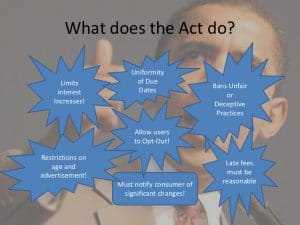Definition of Universal Default
Universal Default is a term used in the credit industry to describe a practice where a credit card issuer raises the interest rate or takes other adverse actions on a cardholder’s account based on the cardholder’s behavior with other creditors. In other words, if you have a credit card with one bank and you default on a loan or miss payments with another bank, the first bank may increase your interest rate or take other negative actions on your credit card account.
This practice is called “universal” because it applies to all of a cardholder’s credit accounts, not just the one in default. It is also sometimes referred to as “cross-default” or “cross-collateralization.”
Universal Default is a controversial practice that has received criticism from consumer advocacy groups. Critics argue that it is unfair for a credit card issuer to penalize a cardholder for actions with other creditors, especially if the cardholder has been making timely payments on their credit card account. They argue that it punishes responsible borrowers for the actions of others and can lead to a cycle of debt and financial hardship.
However, proponents of Universal Default argue that it is a necessary risk management tool for credit card issuers. They argue that if a cardholder is demonstrating financial distress with other creditors, it is a sign that they may be at a higher risk of defaulting on their credit card account as well. By raising the interest rate or taking other adverse actions, they can mitigate their risk and protect themselves from potential losses.
Overall, Universal Default is a practice that can have a significant impact on a cardholder’s credit and financial well-being. It is important for consumers to be aware of this practice and understand how it can affect their credit. By making timely payments on all of their credit accounts and managing their debts responsibly, consumers can protect themselves from the negative consequences of Universal Default.
How Universal Default Works

Universal default is a practice used by credit card companies and lenders that allows them to increase the interest rate on your credit card or loan if you default on any other credit obligation. This means that even if you have been making all your payments on time with a particular lender, if you default on a payment with another lender, your interest rate can be increased.
The concept behind universal default is that it allows lenders to protect themselves from borrowers who may be experiencing financial difficulties or are at risk of defaulting on their loans. By increasing the interest rate, lenders are able to compensate for the increased risk and potential loss they may face.
How does universal default work in practice?
Let’s say you have a credit card with Lender A and a car loan with Lender B. You have been making all your payments on time with both lenders. However, due to unforeseen circumstances, you miss a payment on your car loan with Lender B. Lender B reports the missed payment to the credit bureaus.
Once Lender A becomes aware of the missed payment on your car loan, they can trigger the universal default clause in your credit card agreement. This allows them to increase the interest rate on your credit card, even though you have been making all your payments on time with them. The increased interest rate can significantly impact your ability to pay off your credit card balance and can lead to a cycle of debt.
Why do lenders use universal default?
Lenders use universal default as a risk management tool. By monitoring your credit history and potential default on other credit obligations, lenders can assess your creditworthiness and adjust the terms of your credit agreement accordingly. This allows them to mitigate the potential losses they may face if you default on your payments.
However, universal default has been criticized for its potential to unfairly penalize borrowers. It can lead to higher interest rates and make it more difficult for borrowers to manage their debts. Many consumer advocacy groups argue that universal default is an unfair practice that should be regulated or eliminated.
It is important for borrowers to be aware of the universal default clause in their credit agreements and to make all their payments on time to avoid triggering this clause. By maintaining a good credit history and managing their debts responsibly, borrowers can protect themselves from the negative impact of universal default.
Impact of Universal Default on Your Credit
Universal default can have a significant impact on your credit score and overall financial health. When a lender invokes universal default, it means that they have reviewed your credit report and noticed a negative change in your credit history, such as a late payment or increased credit utilization.
Furthermore, universal default can also negatively affect your credit score. Late payments and high credit utilization are factors that can significantly lower your credit score. If a lender invokes universal default, it can cause your credit score to drop, making it harder for you to qualify for loans, credit cards, or favorable interest rates in the future.
To protect yourself from the impact of universal default, it is essential to maintain a good credit history. Pay your bills on time, keep your credit utilization low, and regularly review your credit report for any errors or discrepancies. By being proactive and responsible with your credit, you can minimize the risk of universal default and maintain a healthy financial profile.
Protecting Yourself from Universal Default
1. Pay Your Bills on Time
One of the best ways to protect yourself from universal default is to pay your bills on time. Late payments can trigger universal default, so make sure to prioritize your payments and set up reminders or automatic payments to avoid missing any due dates.
2. Monitor Your Credit
Regularly monitoring your credit can help you catch any negative changes that may occur due to universal default. You can obtain a free copy of your credit report from each of the three major credit bureaus once a year. Reviewing your credit report can help you identify any errors or discrepancies that need to be addressed.
3. Communicate with Your Creditors
4. Build an Emergency Fund

Having an emergency fund can provide a safety net in case unexpected expenses arise. By having money set aside, you can avoid relying on credit cards or loans to cover these expenses, reducing the risk of default. Aim to save at least three to six months’ worth of living expenses in your emergency fund.
5. Consider Debt Consolidation
If you’re struggling with multiple debts and high interest rates, debt consolidation may be an option to consider. This involves combining your debts into a single loan with a lower interest rate, making it easier to manage and potentially reducing the risk of default.

Emily Bibb simplifies finance through bestselling books and articles, bridging complex concepts for everyday understanding. Engaging audiences via social media, she shares insights for financial success. Active in seminars and philanthropy, Bibb aims to create a more financially informed society, driven by her passion for empowering others.
